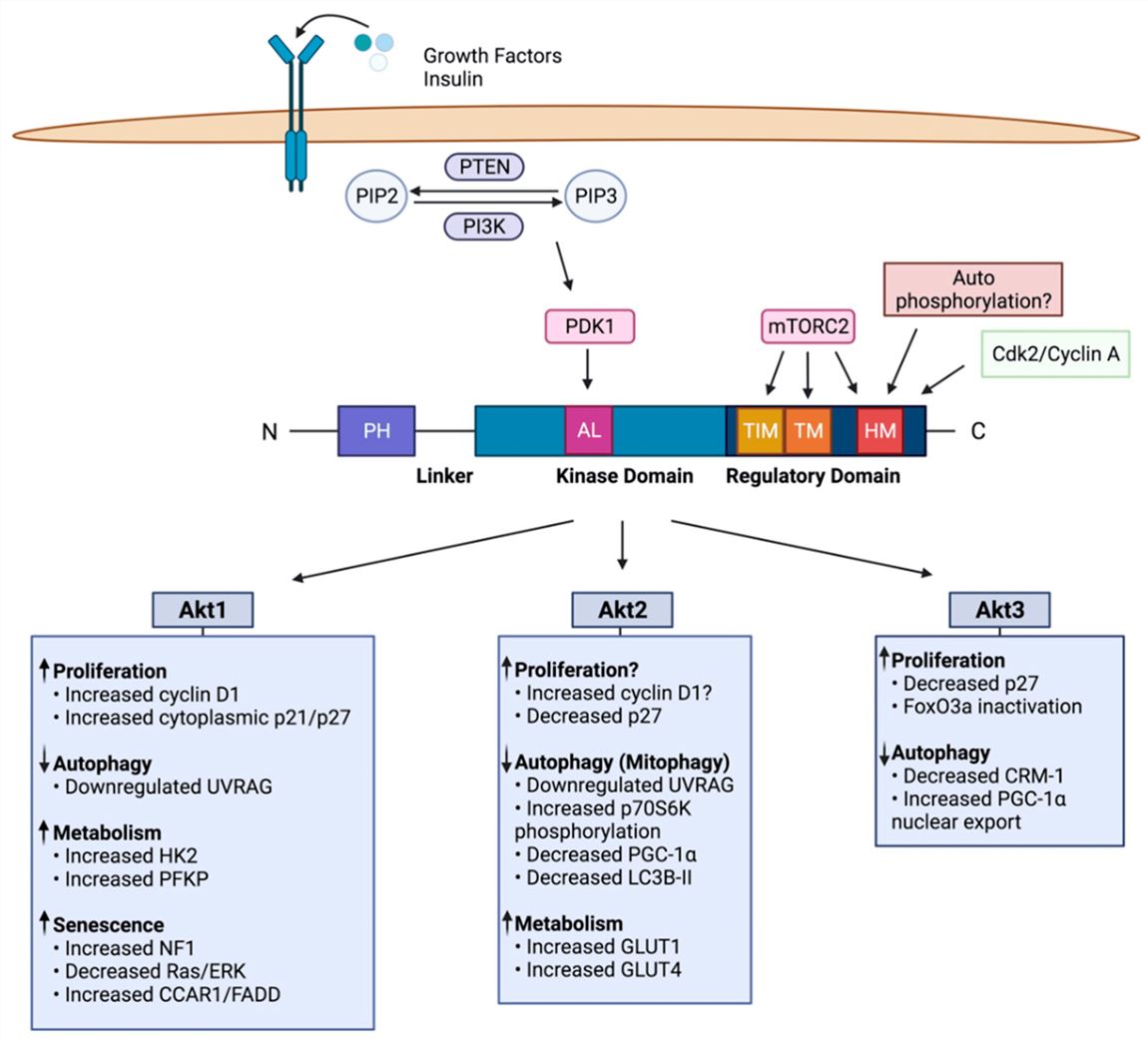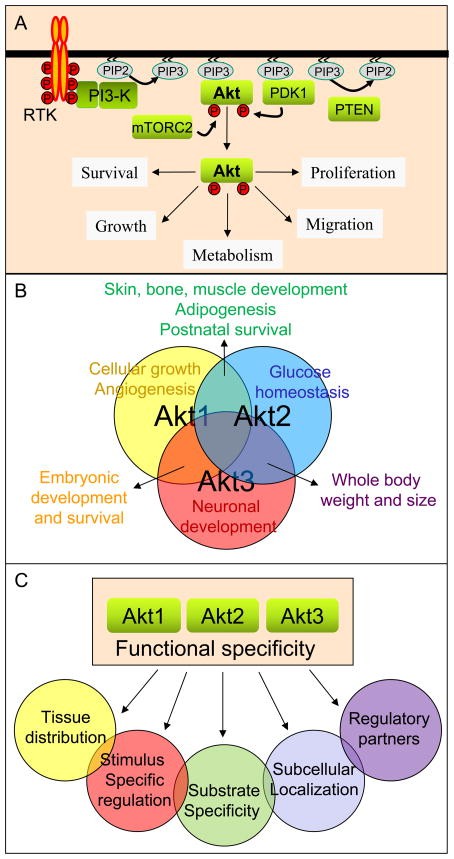Akt Isoforms
Related Symbol Search List
Immunology Background
About Akt Isoforms
Akt, also known as protein kinase B (PKB), is a serine-threonine kinase, belonging to the AGC family of protein kinases. There are three closely related members in the Akt family, namely Akt1(PKBα) , Akt2(PKBβ), and Akt3(PKBγ). Akt1, Akt2, and Akt3 are encoded by distinct genes and share a similar domain structure. They consist of an N-terminal pleckstrin homology (PH) domain, a central kinase domain, and a C-terminal regulatory domain. The PH domain facilitates Akt membrane recruitment, while the kinase domain phosphorylates downstream substrates. They exhibit redundant, distinct, and opposite functions. It acts downstream of the phosphatidylinositol 3-kinase (PI3K) and regulates diverse cellular processes, including cell proliferation, cell survival, metabolism, tumor growth, and metastasis.
Akt isoforms play pivotal roles in regulating diverse cellular processes and have significant implications for disease. Understanding their mechanisms of action and specific functions is essential for deciphering disease mechanisms and developing targeted therapeutic strategies.
 Fig.1 AKT isoforms domain structure and somatic mutations reported in breast cancer. (Perez-Tenorio G, et al., 2014)
Fig.1 AKT isoforms domain structure and somatic mutations reported in breast cancer. (Perez-Tenorio G, et al., 2014)
Mechanism of Action of Akt Isoforms
Akt isoforms are activated in response to various extracellular stimuli, including growth factors, hormones, and cytokines. The activation of Akt involves a multistep process. Upon stimulation, phosphoinositide 3-kinase (PI3K) is activated, leading to the generation of phosphatidylinositol (3,4,5)-trisphosphate (PIP3) from phosphatidylinositol (4,5)-bisphosphate (PIP2). The PH domain of Akt binds to PIP3, promoting its recruitment to the plasma membrane. Subsequently, Akt is phosphorylated at two critical residues (Thr308 and Ser473) by phosphoinositide-dependent kinase 1 (PDK1) and mammalian target of rapamycin complex 2 (mTORC2), respectively. These phosphorylation events lead to full activation of Akt. Activated Akt then phosphorylates a myriad of downstream substrates, influencing diverse cellular processes such as glycogen synthesis, protein synthesis, cell cycle progression, and cell survival. Moreover, Akt isoforms can also translocate into the nucleus, modulating gene expression and impacting cellular functions.
Functions of Akt Isoforms
Akt isoforms regulate diverse cellular functions and are involved in various physiological and pathological processes. Here are some examples of their functions:
- Cell Survival and Apoptosis
Akt isoforms play a crucial role in promoting cell survival and inhibiting apoptosis. They phosphorylate and inactivate pro-apoptotic proteins, such as Bad and caspase-9, while activating anti-apoptotic proteins, such as Bcl-2 and MDM2. Akt activation also promotes cell survival by modulating the activity of transcription factors involved in cell survival pathways.
- Cell Growth and Proliferation
Akt isoforms regulate cell growth and proliferation by modulating protein synthesis, cell cycle progression, and nutrient uptake. They phosphorylate and activate various downstream effectors involved in promoting cell growth, including the mammalian target of rapamycin complex 1 (mTORC1). Akt also plays a role in regulating cell size and organ development.
- Glucose Metabolism
Akt isoforms are involved in the regulation of glucose metabolism. Constitutively active Akt can promote aerobic glycolysis as well as increase both glycolytic rate and glucose uptake. They promote glucose uptake by translocating glucose transporter 4 (GLUT4) to the cell membrane in insulin-responsive tissues. Akt also activates enzymes involved in glycogen synthesis and inhibits enzymes involved in gluconeogenesis, leading to enhanced glucose utilization and storage.
- Tumorigenesis and Cancer Progression
Dysregulation of Akt isoforms has been implicated in tumorigenesis and cancer progression. Constitutive activation of Akt signaling promotes cell survival, proliferation, angiogenesis, and metastasis, contributing to cancer development and progression. Akt isoforms are frequently deregulated in various cancer types and are potential targets for cancer therapy.
Available Resources for Akt Isoforms
Understanding the specific functions and regulation of Akt isoforms is crucial for unraveling the complexities of cellular signaling networks and developing targeted therapies. At Creative BioMart, we offer a comprehensive range of research tools and services to support studies related to Akt isoforms, including recombinant proteins, antibodies, and custom assay development. The following Akt isoforms are displayed, click to view all related molecules/targets and research reagents. Please feel free to contact us with any questions or requests.
 Fig.2 Regulation of Akt signaling. A. Growth factor-mediated Akt activation. B. Overlapping and specific functions of the Akt family members. C. Potential mechanisms dictating Akt isoform functional specificity. (Gonzalez E, et al., 2009)
Fig.2 Regulation of Akt signaling. A. Growth factor-mediated Akt activation. B. Overlapping and specific functions of the Akt family members. C. Potential mechanisms dictating Akt isoform functional specificity. (Gonzalez E, et al., 2009)
References:
- Perez-Tenorio G, Karlsson E, Stål O. Clinical value of isoform-specific detection and targeting of AKT1, AKT2 and AKT3 in breast cancer[J]. Breast Cancer Management, 2014, 3(5): 409-421.
- Basu A, Lambring CB. Akt Isoforms: A Family Affair in Breast Cancer. Cancers (Basel). 2021;13(14):3445. Published 2021 Jul 9.
- Gonzalez E, McGraw TE. The Akt kinases: isoform specificity in metabolism and cancer. Cell Cycle. 2009;8(16):2502-2508.

